Abstract
The present study aims at monitoring the educational policies, programmes and practices in the European Union (hereinafter EU) launched in the period 2011-2017. The study focuses on the EUR-Lex database (EU official law database) enabling a quantitative and qualitative content analysis of the EU educational field from January 2011 to December 2017 by considering the following research areas: (1) the EU strategic framework in the field of education; (2) the relationship between education, innovation, research and the EU governance and institutional priorities. The goal of the research is to indicate how and why the policies, programmes and practices were developed in this period. The research considers the following research topics: (1) "education"; (2) "training"; (3) "youth"; (4) "lifelong learning"; (5) "educational projects"; (6) "educational policies"; (7) "vocational training"; (8) "qualifications"; (9) "competences". The study also reports the EUR-Lex stated criteria: (i) the institutional actors (European Commission, European Parliament, Council of the European Union) (monitoring period: from January 2014 to December 2017); (ii) the year of the document (monitoring years: 2011, 2012, 2013, 2014, 2015, 2016 and 2017) and (iii) the type of the document (monitoring period: from January 2014 to December 2017).
Keywords: EducationEuropean Unioninstitutional governancelegislationpolicies
Introduction
The present study aims at establishing an appropriate research linkage between the educational policies, programmes and practices launched by the European Union in the period 2011-2017. The legal documentation primarily reviews the institutional basis of the EU educational system by enhancing the relationship between the educational performances, training and lifelong learning and considering the main legislation in the field in the selected period 2011-2017 as follows: 1) the EU strategic framework for cooperation and collaboration in the field of education and training (Education and Training 2020 (ET 2020); 2) the legal support of the new strategy for high quality education, “inclusive and future-oriented school and higher education” focused on the fundamental role of the life-long learning, the school education and the digital challenges (Communication from the.., 2017); 3) the legal determinants of the future EU youth strategy here including: employment, social inclusion and citizen participation, educational policies and training perspectives, voluntary initiatives, the linkage between youth, activities, human development, social engagement and youth partnership (Communication from the Commission..., 2018); 4) the EU agenda for supporting the linkage between growth, jobs, higher education systems (Communication from the Commission..., 2011).
Problem Statement
The research focuses on the EU strategic framework in the field of education and on the relationship between education, innovation and research. Considering the EU governance and its institutional priorities, the research displays the results in the period January 2011-December 2017 using the data provided by the EUR-Lex database by selecting the following stated filters: (i) the year of the document (monitoring period: 2011-2017); (ii) the institutional actors: focus on the main institutional actors of the EU governance: European Commission, European Parliament, Council of the European Union (monitoring period: January 2014 – December 2017); (iii) the type of the document: Staff working document, Report and Communication (monitoring period: January 2014 – December 2017). The goal of the present paper is to focus the key aspects of the educational policies and the impact of the decision-making processes at the EU level. However, there are various and complex views regarding the EU educational policies, programmes and practices following: (i) the evaluation of the usefulness of the relationship education – citizenship education (Georgi, 2008) and the transformation of the educational resources (Tuomi, 2013); (ii) a comparative appraisal of the effectiveness of the EU values, principles and policies (Olimid, 2018; Georgescu, 2018); (iii) the EU processes and information affecting good education (Biesta, 2015) and research in science education (Taylor & Villanueva, 2017); (iv) the examination of the educational variables. Prior studies have researched how the policies, programmes and strategies would affect the professional relevance of education (Teichler, 2015) and intercultural education in Europe (Faas, Hajisoteriou & Angelides, 2013). In addition, some argue that including the educational performances in the analysis of the EU institutional governance is relevant as examining two linkages: (i) legal outcomes – social transformation (Halász, 2015); (ii) curricular approach (Soare, 2013) – education outcomes – EU institutional governance (Caspersen, Frølich, & Muller, 2017).
Research Questions
To focus the educational policies, programmes and practices in the European Union institutional governance, we launch three research questions: Q1. How and why the policies, programmes and practices in the field of education were developed and enabled by the EUR-Lex database in the period 2011-2017? Q2. What is the EU main institutional actor in the field of the educational policies, programmes and practices in the selected period? Q3. What types of documents (e.g. Staff working document, Report, Communication) were mainly released in the selected period?
Purpose of the Study
The research can be examined in two different ways: at the individual level and the institutional level. As both levels illustrate, the point of researching the legislation updates within the EU governance is not to collect legislation, but to focus and extend the comparative appraisal in the field of legislation by monitoring the legal documentation in the period 2011-2017. Thus the research aims to present: (i) the legal inputs (EU law, Official Journals, national legislation, etc.) and (ii) the social outputs of the educational policies. Moreover, the study contributes to analyze the EU profile and progress indicators in the field of the educational system: the policy standards, the implementing actions, the supporting actions in the European Union Higher Education Area and the data system, the development dynamics in the educational sector, the education components in the Post-Lisbon period, the training policies at the EU and Member States levels, the role of the social and institutional partnerships, the particular training measures, the cooperation between the European and national authorities, etc.
Research Methods
The study explores a dataset of more than 1000 documents per each finding reviewing and monitoring the EU governance based on the institutional data and legal tools since 2011. The EU legislation mainly focuses on the communications, reports and staff working documents launched and/ or adopted in the period 2011-2017. During a period of three weeks (July 22, 2018 – August 15, 2018), the study focused on the EUR-Lex database (EU official law database) enabling a quantitative and qualitative content analysis of the EU educational field from January 2011 to December 2017 by considering the following research topics in the field: 1) "education"; (2) "training"; (3) "youth"; (4) "lifelong learning"; (5) "educational projects"; (6) "educational policies"; (7) "vocational training"; (8) "qualifications"; (9) "competences". The study uses the data information released by the EU official database of EUR-Lex indicating the appropriateness of the legislation in the selected period and refining the stated criteria of the database: year of the document, the institutional actor and the type of the document in the field of education. The research methodology reveals the importance of the EUR-Lex primary data and legal sources involved in gathering information and statistics related to the educational policies by considering the following research steps: 1. Identification of the nature of the legal data and criteria for evaluating the research findings (the period and the main institutional actors relevant for the educational policies and programmes); 2. Identification of the research topics; 3. Identification of the topics frequency distribution (per year, institution and type of document); 4. Discussion of the key findings and variables.
Findings
The topics frequency distribution per year is considered the inner aspect of the research of the educational programmes and policies. Figure
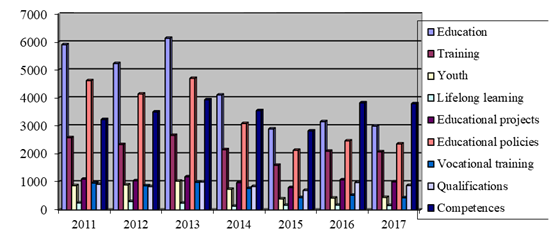
The topics frequency distribution per institutional actor is presented as follows: European Commission (Figure
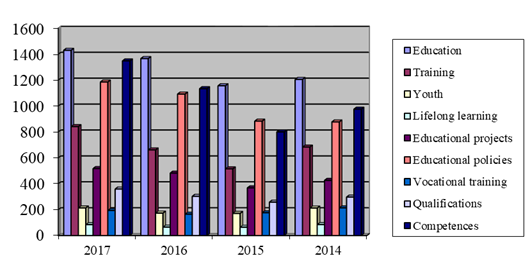
In particular, Figure
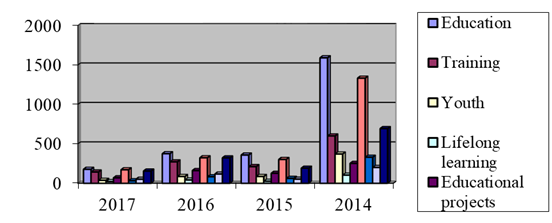
Figure
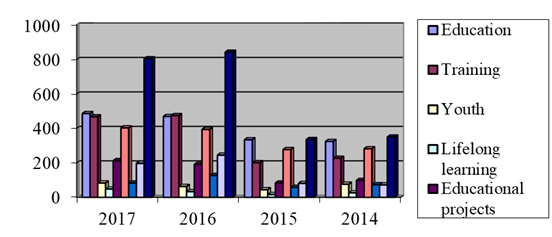
Next, a correlation research evaluated the performance of the following types of documents: Staff working document (Figure
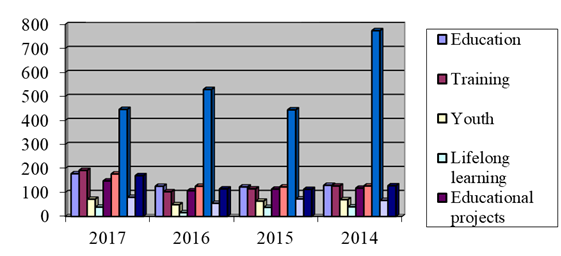
Figure
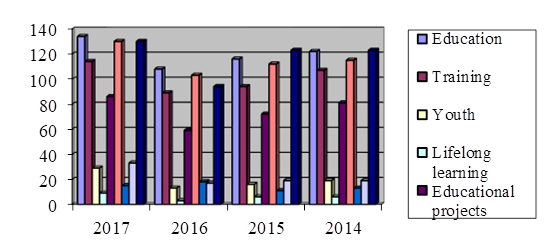
Figure
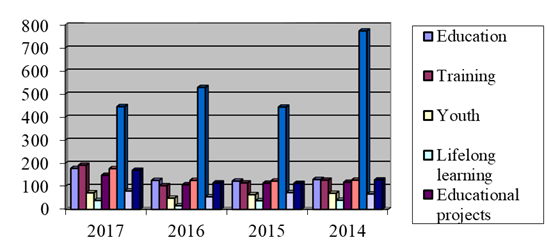
Conclusion
Developing a research model for the analysis of the educational policies, programmes and practices in the European Union institutional governance required a screening of the EUR-Lex data content. This approach enhanced an evaluation of the performances of the institutional actors and the types of documents focusing an increased perception on “education” and “educational policies” as major functions for fostering the EU institutional governance. Moreover, the research of the topics: “training”; “vocational training”; “lifelong learning”; “educational projects”; “competences” and “qualifications” revealed major direct correlations between the EU policies, programmes and projects. On the other hand, the analysis is an effective instrument for developing and integrating a research model based on the activity of the EU institutions in the field of education in the period 2011-2017. The research concluded by positing “education” and related topics: “educational policies” and “educational projects” as the major tools to reform and adapt the EU institutional agenda suggesting new pathways for the vocational training and the lifelong learning perspectives.
References
- Biesta, G. (2015). What is Education For? On Good Education, Teacher Judgement, and Educational Professionalism. European Journal of Education, 50(1), 75-87.
- Caspersen, J., Frølich, N., & Muller, J. (2017). Higher education learning outcomes – Ambiguity and change in higher education. European Journal of Education, 52(1), 8-19. DOI:
- Communication from the Commission to the European Parliament, The Council, The European Economic and Social Committee and the Committee of the Regions. Supporting growth and jobs – an agenda for the modernisation of Europe's higher education systems (2011). Retrieved from https://eur-lex.europa.eu/legal-content/EN/TXT/PDF/?uri=CELEX:52011DC0567&from=EN
- Communication from the Commission to the European Parliament, The Council, the European Economic and Social Committee and the Committee of the Regions. School development and excellent teaching for a great start in life (2017). Retrieved from https://eur-lex.europa.eu/legal-content/EN/TXT/PDF/?uri=CELEX:52017DC0248&from=en
- Communication from the Commission to the European Parliament, The European Council, The European Economic and Social Committee and the Committee of the Regions (2018). Engaging, Connecting and Empowering young people: a new EU Youth Strategy. Retrieved from https://ec.europa.eu/youth/sites/youth/files/youth_com_269_1_en_act_part1_v9.pdf
- Education and Training 2020 (ET 2020) (2009). Council conclusions of 12 May 2009 on a strategic framework for European cooperation in education and training. Retrieved from https://eur-lex.europa.eu/legal-content/EN/TXT/PDF/?uri=CELEX:52009XG0528(01)&from=EN
- EUR-Lex (access to European Union law) (2018). Retrieved from https://eur-lex.europa.eu/homepage.html (Accessed July-August, 2018)
- Faas, D., Hajisoteriou, C., & Angelides, P. (2014). Intercultural education in Europe: policies, practices and trends. British Educational Research Journal, 40(2), 300-318.
- Georgescu, C. M. (2018). The Postmodernity of European Integration: Affirming EU Core Values, Identities and Principles in the Mass Media. Postmodern Openings, 9(2), 196-209. DOI:
- Georgi, V. B. (2008). Citizens in the Making: Youth and Citizenship Education in Europe. Child Development Perspectives, 2, (2), 107-113.
- Halász, G. (2015). Education and Social Transformation in Central and Eastern Europe. European Journal of Education, 50 (3), 350-371.
- Olimid, A. P. (2018). Framing Human Values and Ethical Behavior in the European Union Participatory Governance. Postmodern Openings, 9 (2), 120-133 DOI:
- Soare, E. (2013). Curricular approach of education. Effects on evaluation design. Procedia – Social Social and Behavioral Sciences, 76, 775-779. DOI:
- Taylor, J. C. & Villanueva, M. G. (2017). Research in Science Education for Students with Special Education Needs. In M. T. Hughes & E. Talbott, The Wiley Handbook of Diversity in Special Education (eds.), Wiley – Blackwell, pp. 231-252. DOI:
- Teichler, U. (2015). Changing Perspectives: The Professional Relevance of Higher Education on the Way Towards the Highly‐Educated Society. European Journal of Education, 50(4), 461-477.
- Tuomi, I. (2013). Open Educational Resources and the Transformation of Education. European Journal of Education, 48(1), 58-78. https://doi.org/10.1111/ejed.12019
Copyright information

This work is licensed under a Creative Commons Attribution-NonCommercial-NoDerivatives 4.0 International License.
About this article
Publication Date
15 August 2019
Article Doi
eBook ISBN
978-1-80296-066-2
Publisher
Future Academy
Volume
67
Print ISBN (optional)
-
Edition Number
1st Edition
Pages
1-2235
Subjects
Educational strategies,teacher education, educational policy, organization of education, management of education, teacher training
Cite this article as:
Olimid*, A. P. (2019). Comparing Educational Policies, Programmes And Practices In Eu Institutional Governance (2011-2017). In E. Soare, & C. Langa (Eds.), Education Facing Contemporary World Issues, vol 67. European Proceedings of Social and Behavioural Sciences (pp. 789-797). Future Academy. https://doi.org/10.15405/epsbs.2019.08.03.94
